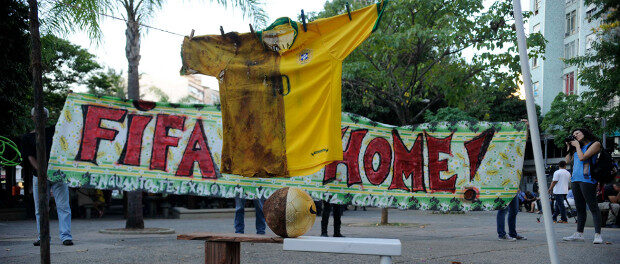
In addition to concerns over public money spent on stadiums and other infrastructure, the World Cup has raised a host of issues that fundamentally challenge urban governance in Brazil.
On Friday June 13, Dr. Christopher Gaffney, geographer and Visiting Professor at the Graduate School of Architecture and Urbanism at the Federal Fluminense University, presented research on the impacts of the World Cup at the Association of Foreign Correspondents. Gaffney, who has been following mega-event developments over the past five years, detailed the organizational structure, costs and potential impacts of the World Cup for an audience of foreign press and researchers the day after the Cup’s opening match.
Gaffney’s main concerns include FIFA’s extractive business model that leads to the misuse of public funds, complex and opaque local governance structures, and rushed urban development.
A general lack of transparency regarding stadium costs and tax exemptions is characteristic of FIFA’s dealings in Brazil. In fact, Brazil’s Bid Book was handed over to FIFA in 2007 and has never been made public. The book outlines the guarantees that the Brazilian government made in order to secure the position as host of this mega-event.
Gaffney stressed the problematic division of responsibility established at the municipal level in preparation for the event. Extraordinary Secretaries for the World Cup (SE-COPAs) were created as parallel local planning structures in each of the twelve host cities. These SE-COPAs are responsible for implementing the Host City Agreements with FIFA, meaning they are in charge of all infrastructure, mobility and stadium projects. There are no direct democratic channels for these offices and they will be dissolved following the World Cup, meaning there is little, if any, accountability.
Beyond the widely reported high costs of stadium construction and renovation, Gaffney further argued that the stadiums themselves are extremely problematic. They are essentially anti-urban projects that do not integrate into the city, their privatization via public-private partnerships represents a dangerous transfer of wealth, and lastly, they have prompted a certain “festishization” of security, which certainly has spillover effects into the rest of the city.
Regarding the legacy of the World Cup, Gaffney highlighted the changing nature of urban space, with a move towards the militarization of the city and the privatization of public space. This means that cities such as Rio de Janeiro are increasingly catering towards the upper classes and foreign visitors, while Gaffney says, “middle and lower classes are feeling more and more excluded from public life and more excluded from the Brazilian national project, if there is one.”
In terms of politics, a lot depends on whether or not Brazil wins the World Cup. A win, Gaffney says, “doesn’t allow for the internal reflection that Brazil desperately needs right now as it goes into an election cycle.”
For more information on Gaffney’s research about the impacts of mega events visit his blog Hunting White Elephants at geostadia.com.

